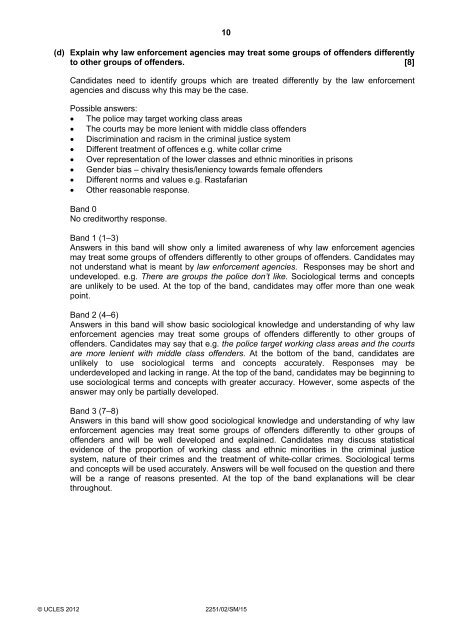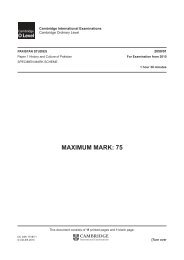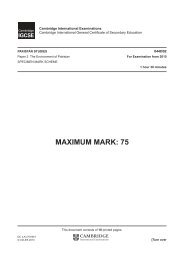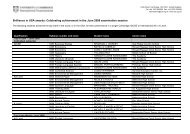MAXIMUM MARK: 70 - Cambridge International Examinations
MAXIMUM MARK: 70 - Cambridge International Examinations
MAXIMUM MARK: 70 - Cambridge International Examinations
You also want an ePaper? Increase the reach of your titles
YUMPU automatically turns print PDFs into web optimized ePapers that Google loves.
10(d) Explain why law enforcement agencies may treat some groups of offenders differentlyto other groups of offenders. [8]Candidates need to identify groups which are treated differently by the law enforcementagencies and discuss why this may be the case.Possible answers:• The police may target working class areas• The courts may be more lenient with middle class offenders• Discrimination and racism in the criminal justice system• Different treatment of offences e.g. white collar crime• Over representation of the lower classes and ethnic minorities in prisons• Gender bias – chivalry thesis/leniency towards female offenders• Different norms and values e.g. Rastafarian• Other reasonable response.Band 0No creditworthy response.Band 1 (1–3)Answers in this band will show only a limited awareness of why law enforcement agenciesmay treat some groups of offenders differently to other groups of offenders. Candidates maynot understand what is meant by law enforcement agencies. Responses may be short andundeveloped. e.g. There are groups the police don’t like. Sociological terms and conceptsare unlikely to be used. At the top of the band, candidates may offer more than one weakpoint.Band 2 (4–6)Answers in this band will show basic sociological knowledge and understanding of why lawenforcement agencies may treat some groups of offenders differently to other groups ofoffenders. Candidates may say that e.g. the police target working class areas and the courtsare more lenient with middle class offenders. At the bottom of the band, candidates areunlikely to use sociological terms and concepts accurately. Responses may beunderdeveloped and lacking in range. At the top of the band, candidates may be beginning touse sociological terms and concepts with greater accuracy. However, some aspects of theanswer may only be partially developed.Band 3 (7–8)Answers in this band will show good sociological knowledge and understanding of why lawenforcement agencies may treat some groups of offenders differently to other groups ofoffenders and will be well developed and explained. Candidates may discuss statisticalevidence of the proportion of working class and ethnic minorities in the criminal justicesystem, nature of their crimes and the treatment of white-collar crimes. Sociological termsand concepts will be used accurately. Answers will be well focused on the question and therewill be a range of reasons presented. At the top of the band explanations will be clearthroughout.© UCLES 2012 2251/02/SM/15
















